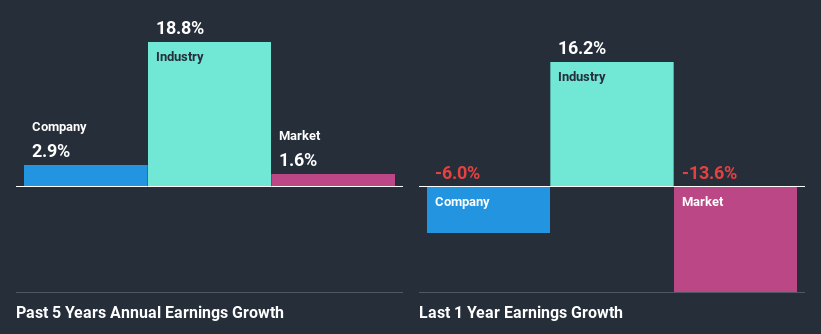- South Africa
- /
- IT
- /
- JSE:PBT
Is PBT Group Limited's (JSE:PBG) Stock Price Struggling As A Result Of Its Mixed Financials?
Group (JSE:PBG) has had a rough month with its share price down 7.3%. It seems that the market might have completely ignored the positive aspects of the company's fundamentals and decided to weigh-in more on the negative aspects. Stock prices are usually driven by a company’s financial performance over the long term, and therefore we decided to pay more attention to the company's financial performance. Specifically, we decided to study Group's ROE in this article.
Return on equity or ROE is an important factor to be considered by a shareholder because it tells them how effectively their capital is being reinvested. In simpler terms, it measures the profitability of a company in relation to shareholder's equity.
Check out our latest analysis for Group
How Do You Calculate Return On Equity?
Return on equity can be calculated by using the formula:
Return on Equity = Net Profit (from continuing operations) ÷ Shareholders' Equity
So, based on the above formula, the ROE for Group is:
14% = R52m ÷ R357m (Based on the trailing twelve months to September 2020).
The 'return' is the amount earned after tax over the last twelve months. So, this means that for every ZAR1 of its shareholder's investments, the company generates a profit of ZAR0.14.
Why Is ROE Important For Earnings Growth?
Thus far, we have learned that ROE measures how efficiently a company is generating its profits. Based on how much of its profits the company chooses to reinvest or "retain", we are then able to evaluate a company's future ability to generate profits. Assuming all else is equal, companies that have both a higher return on equity and higher profit retention are usually the ones that have a higher growth rate when compared to companies that don't have the same features.
Group's Earnings Growth And 14% ROE
On the face of it, Group's ROE is not much to talk about. However, given that the company's ROE is similar to the average industry ROE of 18%, we may spare it some thought. On the other hand, Group reported a fairly low 2.9% net income growth over the past five years. Bear in mind, the company's ROE is not very high . So this could also be one of the reasons behind the company's low growth in earnings.
As a next step, we compared Group's net income growth with the industry and were disappointed to see that the company's growth is lower than the industry average growth of 21% in the same period.

The basis for attaching value to a company is, to a great extent, tied to its earnings growth. What investors need to determine next is if the expected earnings growth, or the lack of it, is already built into the share price. This then helps them determine if the stock is placed for a bright or bleak future. One good indicator of expected earnings growth is the P/E ratio which determines the price the market is willing to pay for a stock based on its earnings prospects. So, you may want to check if Group is trading on a high P/E or a low P/E, relative to its industry.
Is Group Using Its Retained Earnings Effectively?
Group has a low three-year median payout ratio of 24% (meaning, the company keeps the remaining 76% of profits) which means that the company is retaining more of its earnings. This should be reflected in its earnings growth number, but that's not the case. So there might be other factors at play here which could potentially be hampering growth. For example, the business has faced some headwinds.
Additionally, Group has paid dividends over a period of eight years, which means that the company's management is determined to pay dividends even if it means little to no earnings growth.
Summary
In total, we're a bit ambivalent about Group's performance. While the company does have a high rate of reinvestment, the low ROE means that all that reinvestment is not reaping any benefit to its investors, and moreover, its having a negative impact on the earnings growth. Wrapping up, we would proceed with caution with this company and one way of doing that would be to look at the risk profile of the business. You can see the 2 risks we have identified for Group by visiting our risks dashboard for free on our platform here.
If you’re looking to trade Group, open an account with the lowest-cost* platform trusted by professionals, Interactive Brokers. Their clients from over 200 countries and territories trade stocks, options, futures, forex, bonds and funds worldwide from a single integrated account. Promoted
New: Manage All Your Stock Portfolios in One Place
We've created the ultimate portfolio companion for stock investors, and it's free.
• Connect an unlimited number of Portfolios and see your total in one currency
• Be alerted to new Warning Signs or Risks via email or mobile
• Track the Fair Value of your stocks
This article by Simply Wall St is general in nature. It does not constitute a recommendation to buy or sell any stock, and does not take account of your objectives, or your financial situation. We aim to bring you long-term focused analysis driven by fundamental data. Note that our analysis may not factor in the latest price-sensitive company announcements or qualitative material. Simply Wall St has no position in any stocks mentioned.
*Interactive Brokers Rated Lowest Cost Broker by StockBrokers.com Annual Online Review 2020
Have feedback on this article? Concerned about the content? Get in touch with us directly. Alternatively, email editorial-team (at) simplywallst.com.
About JSE:PBT
PBT Holdings
Provides consulting services to finance, insurance, medical healthcare, retail, telecommunication, and other sectors in South Africa, Europe, Australia, and the United Kingdom.
Excellent balance sheet established dividend payer.
Market Insights
Community Narratives



